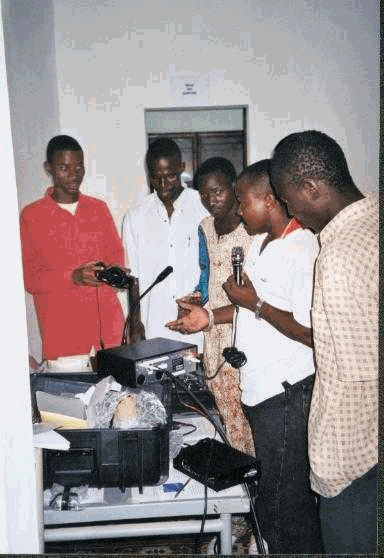
Webworld News Item
Timbuktu Mobile Radio Battles Locust Hordes
For the past month, the people of Timbuktu in Mali have been battling hordes of locusts that are destroying their crops, with the help of the suitcase radio donated by UNESCO in 2001. "The suitcase radio is very, very important in this struggle against the locusts", explained radio technician Mahi Touré, "we broadcast daily crisis programmes from the suitcase, retransmitted on all four radio stations in Timbuktu, to tell people where to go and to organize the fight against the invading swarms".
With few government resources available for costly action such as airborne surveillance and spraying, Timbuktu is having to rely on traditional methods such as smoking the locusts out, beating the swarms with sticks and with the traditional boubou cloth. This requires the mobilization of large numbers of people. The mobile radio is taken to the anti-locust operational headquarters run by the authorities and even into the fields to broadcast live from the local communities.
The languages spoken in this cultural cross-roads include Tamacheq, Songhay, Peulh, Arabic, French and Bambara, and radio provides the only effective means of ensuring urgent information reaches all communities in all languages and is therefore understood by all. It also allows local people to participate, have their say and share traditional knowledge – which is proving vital at the moment.
"Old people explain the traditional methods of fighting the locust hordes. We also broadcast calls to mobilize the villagers. Today, the army and the youth of Timbuktu will be going out together to fight the swarms", explained Mr Touré. The special broadcasts link up all five radio stations each day from 9am to 11 am and from 10pm until midnight. "There has never been such an effective way to mobilize all the people of our area before", noted Mr Touré.
The radio presenters use the local telecentre to obtain online information for these programmes. The suitcase radio was originally donated by UNESCO within the framework of its Community Multimedia Centre programme, in order to help the radio stations make optimal use of the telecentre resources. Staff from each station have been given training in web searching and in producing "radio browsing" programmes in which the presenter browses pre-selected web sites on air, explaining and discussing the contents with a local expert in the national languages.
In less critical times, the stations also use the suitcase unit to cover local sporting events such as football matches and official celebrations. The unit has even been much in demand to give a special touch to Touareg weddings at nomadic camps in the desert surrounding Timbuktu.
But with the current locus crisis, it has become clear that the suitcase radio has a vital role to play in reaching the people of the dozens of villages scattered across the area and UNESCO has decided to provide the radio stations with a 100 watt suitcase, which will greatly increase the broadcast radius from the current 15 to 20 kilometres possible with the 30 watt transmitter.
Although the radio stations of Timbuktu are small and under-funded, they have successfully managed to share the cost of maintenance of the unit and have carried out live outside broadcasts weekly for three years. The suitcase radio is made by the Canadian company Wantok Entreprises and is designed to be extremely simple to use and to withstand harsh conditions such as those of the Sahara desert.
Contact : Stella Hughes
CMC Url : http://www.unesco.org/webworld/cmc
Suitcase radio url: www.wantokent.com

Technicians from Timbuktu’s radio stations gather round the suitcase radio.